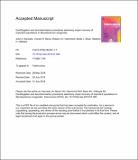Files in this item
Centrifugation and decontamination procedures selectively impair recovery of important populations in Mycobacterium smegmatis
Item metadata
| dc.contributor.author | Kennedy, John A. | |
| dc.contributor.author | Baron, Vincent O. | |
| dc.contributor.author | Hammond, Robert J. H. | |
| dc.contributor.author | Sloan, Derek J. | |
| dc.contributor.author | Gillespie, Stephen H. | |
| dc.date.accessioned | 2019-07-31T23:41:38Z | |
| dc.date.available | 2019-07-31T23:41:38Z | |
| dc.date.issued | 2018-08-01 | |
| dc.identifier | 255192828 | |
| dc.identifier | e7f7b975-717c-4fb6-87cf-f53b1f59e2b7 | |
| dc.identifier | 85051142006 | |
| dc.identifier | 000443991700011 | |
| dc.identifier.citation | Kennedy , J A , Baron , V O , Hammond , R J H , Sloan , D J & Gillespie , S H 2018 , ' Centrifugation and decontamination procedures selectively impair recovery of important populations in Mycobacterium smegmatis ' , Tuberculosis . https://doi.org/10.1016/j.tube.2018.07.008 | en |
| dc.identifier.issn | 1472-9792 | |
| dc.identifier.other | RIS: urn:366D0CB90D442947A91A6B152C2C3DBB | |
| dc.identifier.other | ORCID: /0000-0001-6537-7712/work/47356679 | |
| dc.identifier.other | ORCID: /0000-0002-7888-5449/work/60631025 | |
| dc.identifier.other | ORCID: /0000-0003-3664-3641/work/157140932 | |
| dc.identifier.uri | https://hdl.handle.net/10023/18225 | |
| dc.description | This work was supported by PreDiCT-TB (SMDO XEU-07). | en |
| dc.description.abstract | Diagnosis and treatment monitoring of patients with tuberculosis (TB) requires detection of all viable mycobacteria in clinical samples. Quantitation of Mycobacterium tuberculosis (Mtb) in sputum is commonly performed by culture after sample decontamination to prevent overgrowth by contaminant organisms. Exponentially growing cultures have cells that predominately lack non-polar lipid bodies whereas stationary cultures have a predominance of cells with non-polar lipid bodies. This may reflect rapidly growing ‘active’ and non-replicating ‘persister’ sub-populations respectively in sputum from TB patients. We investigated the effect of decontamination on culture-based quantitation of exponential and stationary phase cultures of Mycobacterium smegmatis in an artificial sputum model. Exponentially growing populations were between 89 and 50 times more susceptible to decontamination than stationary phase cultures when quantified by most probable number and colony forming units. These findings suggest that decontamination selectively eliminates the ‘active’ population. This may impair diagnostic sensitivity, treatment monitoring, and compromise clinical trials designed to identify new antibiotic combinations with activity against all mycobacterial cell states. | |
| dc.format.extent | 650463 | |
| dc.language.iso | eng | |
| dc.relation.ispartof | Tuberculosis | en |
| dc.subject | Mycobacteria | en |
| dc.subject | Decontamination | en |
| dc.subject | Dormancy | en |
| dc.subject | Sample processing | en |
| dc.subject | Culture | en |
| dc.subject | RA0421 Public health. Hygiene. Preventive Medicine | en |
| dc.subject | NDAS | en |
| dc.subject | SDG 3 - Good Health and Well-being | en |
| dc.subject.lcc | RA0421 | en |
| dc.title | Centrifugation and decontamination procedures selectively impair recovery of important populations in Mycobacterium smegmatis | en |
| dc.type | Journal article | en |
| dc.contributor.sponsor | European Commission | en |
| dc.contributor.institution | University of St Andrews. School of Medicine | en |
| dc.contributor.institution | University of St Andrews. Infection and Global Health Division | en |
| dc.contributor.institution | University of St Andrews. Global Health Implementation Group | en |
| dc.contributor.institution | University of St Andrews. Gillespie Group | en |
| dc.contributor.institution | University of St Andrews. Biomedical Sciences Research Complex | en |
| dc.contributor.institution | University of St Andrews. Infection Group | en |
| dc.identifier.doi | https://doi.org/10.1016/j.tube.2018.07.008 | |
| dc.description.status | Peer reviewed | en |
| dc.date.embargoedUntil | 2019-08-01 | |
| dc.identifier.grantnumber | en |
This item appears in the following Collection(s)
Items in the St Andrews Research Repository are protected by copyright, with all rights reserved, unless otherwise indicated.

